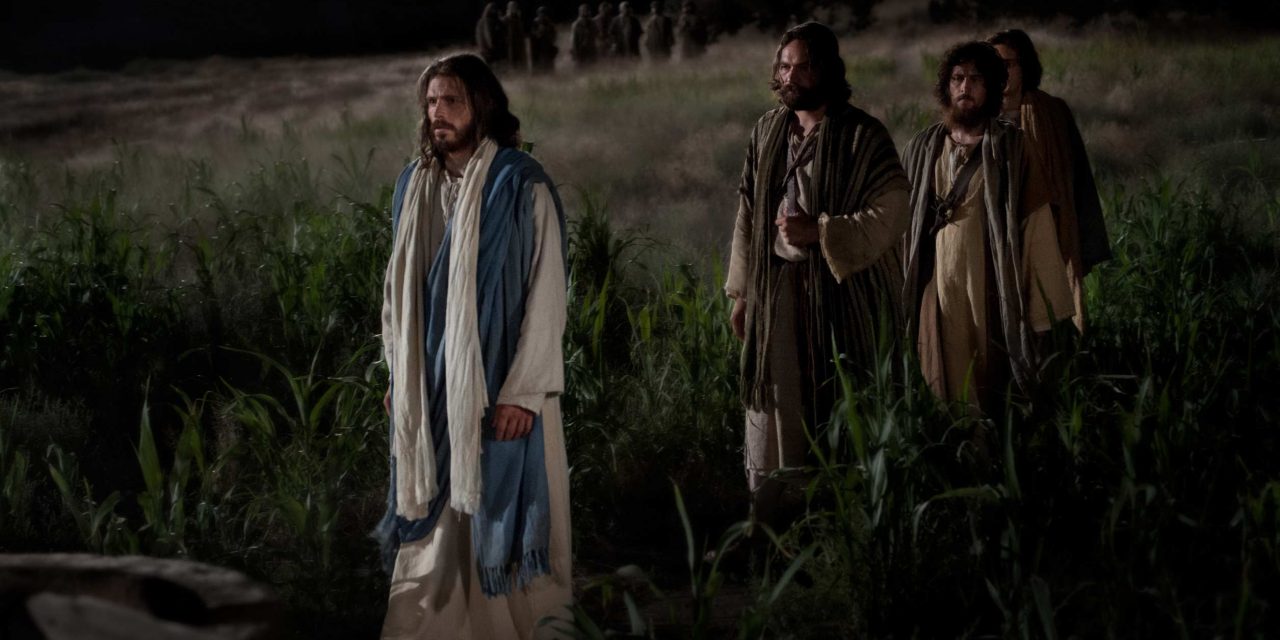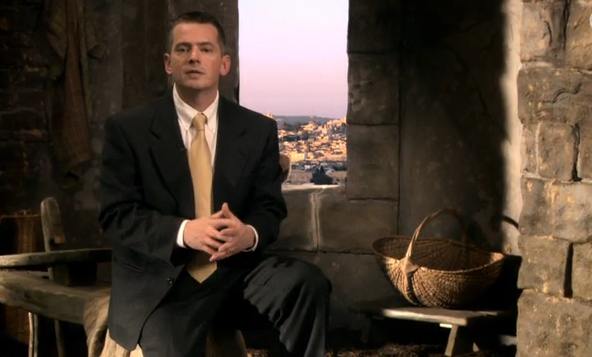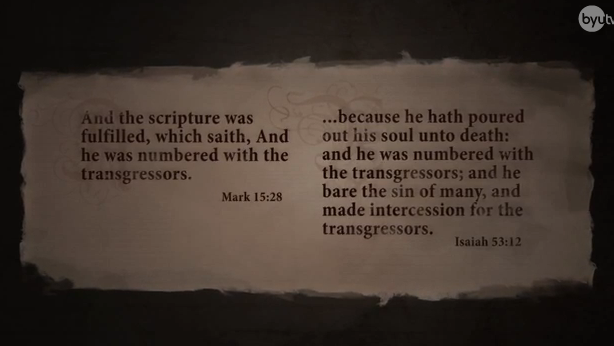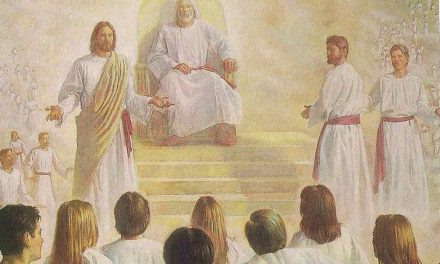KENT BROWN: So Jesus arrives with the eleven. Judas has already separated himself. They come inside the garden, somewhere on the lower slopes of the Mount of Olives. He leaves eight near the gate, near the entryway, and takes three with Him farther into the garden. These are Peter, James, and John, those who have been with Him from the earliest days after He began to call the Twelve.
There are two basic things to notice about this. The first is the intensity of the suffering which now descends upon Him. And he, He says to the three that He is sorrowful even unto death. The weight of our sins, our mistakes, falling on a sinless man, in such enormity, brings Him to the point at which He wishes that He could push this away. He leaves them there, He goes farther into the garden and prays. And this is the second part. Each one of the synoptic gospels repeats his actions in the imperfect tense in Greek, which is the tense of customary action: he used to do this, she used to do that. And it also has to do with iterative action, repeated action. So that we read that Jesus went forward and fell and prayed, went forward and fell and prayed, went forward and fell and prayed.
This series of repeated actions that the verbs convey to readers indicates the intensity of the suffering He’s going through. He doesn’t just pray once. He must have straightened Himself up and trying to relieve Himself in some way, went forward and prayed again. This is a scene which is compelling to me, and tells me just in the way that it’s written, that Jesus suffers deeply, unfathomably at this moment, for you and for me.
CECILIA M. PEEK: Luke gives us one very moving detail about Christ’s suffering in Gethsemane that none of the other gospel writers shares, though we do have confirmation of it, both from the Book of Mormon and from the Doctrine and Covenants. And this is what Luke says: Kai genomonos en agonia, ektenesterone pros ao heto. Kai agenoto hohedros, al tu hose thromboi haimatos katabainontes epi taingain. Which translated means “and being in an agony, he prayed the more earnestly: and his sweat was as great drops of blood dropping down to the ground” (Luke 22:44).
There are a couple of gift phrases there. One is the Greek term agonia, being in an agony. It comes actually from the Greek word agon which typically would be used to refer to an athletics contest. And so some scholars have taken Luke’s description of His sweat being as it were great drops of blood, to simply suggest this building anxiety that an athlete feels before a competitive confrontation—which is an interesting interpretation.
LDS students of the scriptures believe that it really was blood, and non-LDS scholars treat this phrase that Luke uses—and the key word here is hos—and it’s whether he means it adverbially or adjectivally. That is to say, is he saying it was in fact as drops of blood, or that it was like great drops of blood? And without any additional input, there would be no way to know certainly which of the two types of uses of hos Luke meant there. But we have additional restoration scripture, both in the Book of Mormon, in Mosiah where he says that Christ bled from every pore, and then more specifically in the Doctrine and Covenants, the Lord Himself speaks, describing in the most explicit and clear terms He uses anywhere in scripture, His own experience of suffering through the Atonement.
And He describes that suffering in these terms: “Which suffering caused myself, even God, the greatest of all, to tremble because of pain, and to bleed at every pore, and to suffer both body and spirit, and would that I might not drink the bitter cup, and shrink. Nevertheless, glory be to the Father, and I partook, and finished my preparations unto the children of men” (Doctrine and Covenants 19:18).
If there’s any doubt at all what Luke meant, Christ clarifies it, that He in fact bled from every pore.
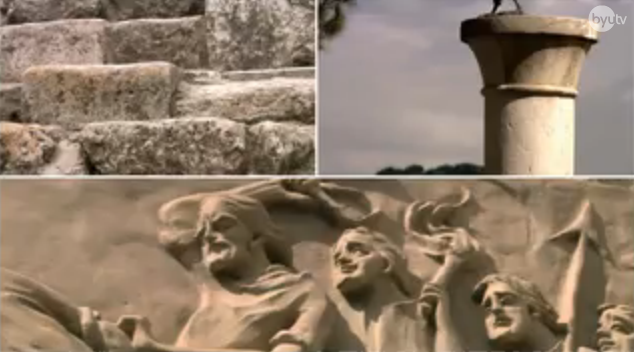 MARILYN ARNOLD: The Book of Mormon expands our understanding of the infinite nature of the Atonement. It’s interesting to me that the term infinite atonement, appears only in the Book of Mormon, only Book of Mormon speakers use that phrase. In fact the word infinite appears in the Bible only three times, and those three times are in the Old Testament, and none of them refers to the Atonement of Jesus Christ. So this is a new idea that expands this, what the Atonement is, by calling it infinite.
MARILYN ARNOLD: The Book of Mormon expands our understanding of the infinite nature of the Atonement. It’s interesting to me that the term infinite atonement, appears only in the Book of Mormon, only Book of Mormon speakers use that phrase. In fact the word infinite appears in the Bible only three times, and those three times are in the Old Testament, and none of them refers to the Atonement of Jesus Christ. So this is a new idea that expands this, what the Atonement is, by calling it infinite.
Through the Atonement, mortals were released from both death and hell. They were released from the death of the body and the death of the spirit. And Jacob makes that point very, very plainly. This sacrifice is of the Son of God, infinite and eternal, no other being except a God could perform this infinite Atonement. That therefore it is infinite, because it is the sacrifice of the Son of God, infinite and eternal.
JOHN S. TANNER: No one goes through this life without accumulating some sins. And we need that Atonement every day of our lives. And I’m grateful that the Lord has through the sacrament allowed me every week to renew that commitment. I love the word willing in the sacramental prayer. Because it says, are you willing to take upon you this name? And I think, Lord, I’m willing. I may not have been perfect this week, but I recommit to my willingness to live the gospel. And the only way I can do that is because the Lord has sacrificed Himself. And the only way I can get there is because the Lord has enabled us to tie our strength to His strength, to have our abilities magnified by His abilities, because He’s not just forgiven us, He helps us become who we have the capacity to become, but only with His help. And I feel that every day too. This is too big for me sometimes, this is just too hard. How am I going to do it? And He has made that possible through His grace.
VIRGINIA PEARCE: And I believe there is such a wonderful synergy between my responsibility to do everything I can, and then His—not only responsibility, but His covenant promise to me that He will do what I cannot do. And that’s the grace piece. He is not only willing to forgive me and take that pain away, but He is willing to bind up the wounds of those whom I have wounded. So there is just grace everywhere, everywhere, operating in our lives. Even as we strive and work and do in every way that we possibly can.
MARILYN ARNOLD: The prayer Jesus uttered in Gethsemane is very, very brief, but it’s very, very moving. It touches us deeply. Because in this prayer, Jesus is pouring out His soul. He knows what ordeal He’s facing, and He’s pouring out His soul to His beloved Father. And we sense a lot of things in there that we could apply in our own lives I think, that this wonderful relationship that He and the Father have.
In Mark’s account of the prayer—and the wording is pretty much the same in all three accounts in the gospels. But Mark adds a word. He adds the word Abba. Jesus addresses the Father as Abba, Father. This is the intimate kind of relationship that He had with His Father. And some of us feel sometimes that the Father is so distant from us that we can hardly talk with Him; we’re afraid and it is proper to use formal language. But to realize that He loves us, and that we can have this kind of tender relationship with Him.
And there He is asking the Father if He would release Him from this. But then He says, and that big word nevertheless—nevertheless not my will but thine, not what I will but what thou wilt.
CYNTHIA HALLEN: So He experienced the pain and the sorrow and the disappointment and the fear of failure and the hurt of rejection and the longing and the homesickness and the desire to be reunited with our loved ones, so that we will have joy and beauty for ashes. He did it literally, because He wants us to have not a fake substitute joy, not some kind of cosmetic or counterfeit happiness, He wants us to have the real joy of having the perfect love that He had, and the perfect love that our Heavenly Father has.
BRENT L. TOP: The Atonement of Jesus Christ is deeply personal, in that it transforms me. It changes my desires. It changes my nature. That is what the Atonement of Jesus Christ is. It redeems, it rescues, it lifts, it loves, it transforms us into new creatures.
KENT BROWN: One of the best known stories of course in the New Testament is that of the arrest of Jesus. The conspiracies, the plots, began months and months before. There was one that was hatched in Galilee against Him. Apparently the conspirators found each other when Jesus healed the man with the withered hand.
So finally the time comes. Judas leads a band of people to where he very much suspects that Jesus and the eleven are. Each of the synoptics say that Judas approaches Jesus to kiss Him. Both Matthew and Mark say that Judas did. Luke leaves it implicit. He doesn’t actually say that Judas kissed Him. I, I’ve wondered in my own heart whether Luke was so offended at this scene that he couldn’t imagine the betrayer kissing the Master.
When the arresting party arrives there, Jesus approaches them and asks them, “Whom do you seek?” They say, Well, Jesus of Nazareth of course. And then Jesus says, “I am he.” The expression here is the divine name, which stands in isolation from everything else that Jesus says, when He says, I am. And these people who apparently have come with some fear, wondering what might happen to them, begin to step back, and one steps on the foot of the person behind, and they all end up on the ground. It’s a bit of a comic scene, although it’s very serious of course.
After they’ve stood up again and recovered themselves, He asks them again, Whom seek, whom seek you? And they say, Jesus of Nazareth. And He again says, “I am” (John 18:4–8)
RICHARD ANDERSON: When Jesus was arrested in the Garden of Gethsemane, the apostles fled in terror. They had been involved in the confrontation with the arresting guard, and particularly Peter was targeted by some people there as an enemy who had attacked one of the individuals trying to arrest Jesus. So the apostles felt that they were hunted men, and they did not disclose their location, although the apostles were still together, counseling, trying to rebalance, think through what on earth had happened, and the disillusionment of all of their dreams and plans. Because they didn’t fully understand the prophecy and how it would be fulfilled when Jesus said He would leave them.
KENT BROWN: So they arrest Him, bind Him, and now off they go, presumably down the Kidron Valley, walking down to a gate farther down on the east side of the city that they could come in, and then come up the long set of steps towards the High Priest’s residence.
JOHN S. TANNER: Following His arrest in Gethsemane, an exhausted Jesus comes back along the Kidron Valley, and then He has to climb these steep stairs up to the palace of Caiaphas, the High Priest. He’s followed by Peter afar off, and one other unnamed disciple. And there in the palace of Caiaphas, while Peter waits in the darkness, Jesus, the Eternal Judge, is Himself judged of men in an illegal nighttime hearing, wherein the verdict is decided well before the proceedings even begin. As Matthew explains the irony of this, some of His judges had met in this very same palace about two days before and consulted, that they might take Him by subtlety and kill Him (Matthew 26:4, 59).
ERIC D. HUNTSMAN: Although the gospel accounts paint a dramatic picture of the events that terrible night, when Jesus was brought first before the Jewish authorities and then the Roman governing authorities, we need to remember that they do not give us the kind of legal details that we really need to understand exactly what happened from a technical point of view. They are trying to paint a picture of the terrible realities of how the Savior of the world was misjudged and abused, and how all involved, both Jewish leaders and Romans, were involved in His wrong condemnation. We have actually very little evidence for how Jewish trials were done in the Second Temple period from contemporary sources. What we do have is a great amount of information, legal rulings, opinions, memories of how things were done, from a later source called the Mishnah, that was compiled about 200 A.D. It may in many instances reflect actual practice at the time of Jesus, but in some instances it may not reflect what actually happened.

